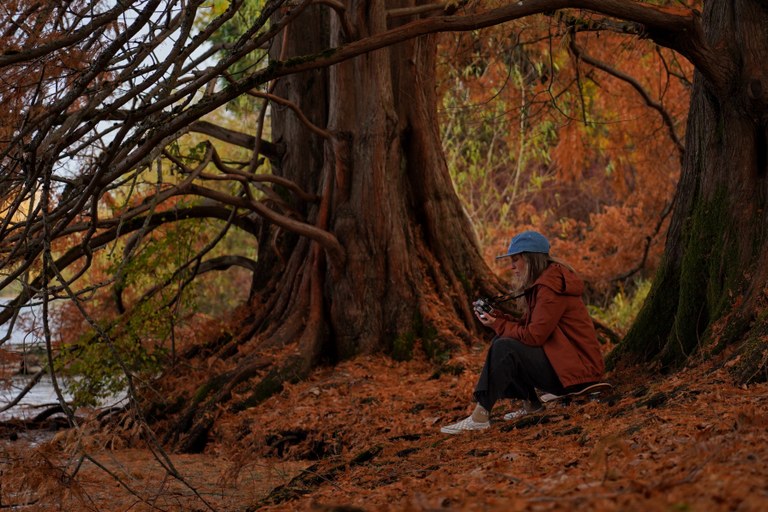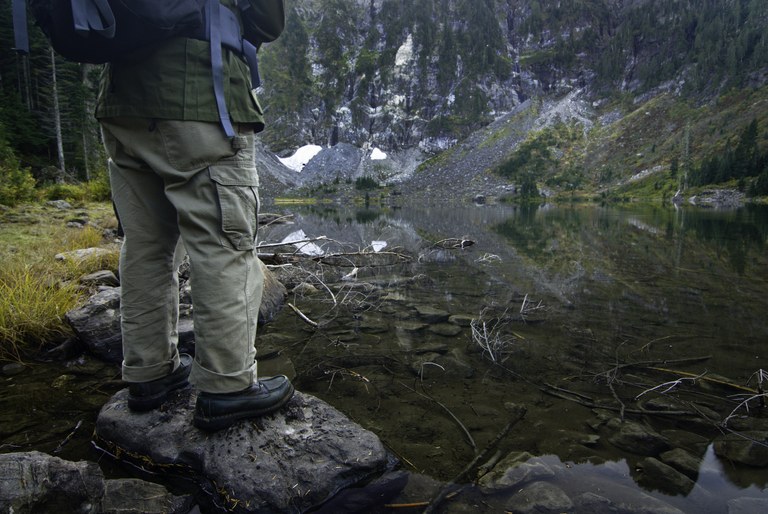 Washington Trails
Association
Washington Trails
Association
Trails for everyone, forever
When a day on trail doesn't go how you'd planned, taking a time to find gentle perspective can help you calm your irritation and see the bigger picture. By Beth Glosten.
You’ve found the perfect hike – just the right distance, elevation gain and location for your planned day off. You arrive early to the trailhead, grateful for a parking spot. You take advantage of the pit toilet, happy to find it unlocked, but find that it lacks toilet paper, and the trash bin is overflowing. Out on the trail, you noticed that the trail could certainly use some work, muddy areas, brush and some fallen logs.
This situation is certainly frustrating and could put a damper on your wilderness joy. It’s a scenario folks saw this summer, and continue to see in the face of limited funding, government shutdowns and limited staffing. The employees of the Bureau of Land Management, the National Parks Service, and the National Forest Service are struggling to fulfill their respective roles managing our outdoor spaces in the face of continuing staff and funding cuts. Since the pandemic, our outdoor spaces have experienced significant increases in visits. These cuts come at a time when resources are already over-taxed.

What to do? First, we can get involved and help! Perhaps there is a trail crew scheduled to do work that you could join. Or you could gather friends to hike with trash bags to help keep our trails tidy.
All of that is important. And, there is another, more internal way, to manage disappointment — by adjusting our mindset.
Humans tend to categorize experiences as “pleasant,” “unpleasant,” or “neither pleasant nor unpleasant (neutral).” Knowing we do this can help maintain steadiness during a challenging situation. We can remain mindful – aware of present moment experience without expending lots of emotional energy wishing the situation were different than it is. While this may sound like complacency, it is not. It is acceptance. Removing our emotional overlay from a frustrating experience helps us see it clearly. You can then see an injustice, and act. Or perhaps the situation requires a deep breath and tolerance. Or perhaps you need to change your plans.
A very common unpleasant condition is being stuck in traffic. You inch along, watch the time tick by, knowing you’re going to be late. When you notice this displeasure, say to yourself, “this is unpleasant, I don’t like this.” Suddenly there is space between you and the event. It is not personal, it just is. Look around, see others in traffic, know you are not alone, and acknowledge, in fact, that you are part of the traffic problem.

While a day on trail might not always go as planned, slowing down can help. Photo by Jorge Martinez.
We can bump into “unpleasant” out on a trail. Mindful awareness of our reactions, and labeling the experience can help us stay steady, and not let the “unpleasant” drown out the “pleasant.” Our minds tend to have “Velcro for the negative, and Teflon for the positive.” That is, we give more attention to negative events than positive ones. Perhaps an evolutionary advantage (best to know where danger is) this mindset risks us missing the wonders around us.
During the COVID pandemic, I set out to hike to Lake 22. I was angry to see toilet paper piles along the trail, and my judging mind quipped “Mother Nature does not have a cleaning lady!” I arrived at the lake to find it placid and quiet. Ah. Just what I like! But then the enthusiastic family arrived (perhaps a birthday party?) with cheers and hoots and hollers that echoed in the cirque. Again, my judging mind rose up, “Be quiet! There are others here!” I forced my idea of “pleasant” onto the others visiting – how arrogant! Plus, I let my judgements diminish the grandeur of the scenery and the glorious sunny summer day.
When frustration arises on a hike (or anywhere, for that matter), pause and take a deep breath. Slow down. Acknowledge your irritation, but then also notice the other wonderful things around you. Allow yourself to take in the forest scenery, desert landscape, the smell of earth, or the sounds of a crashing waterfall. Detach the Velcro of disappointment, and revel in the wonders of the out-of-doors that inspired you to get out this day!
I invite you to bring mindfulness to the wilderness, along with a sense of humor, realism, and patience. I am sure some disappointing circumstances will arise. Try the practice of labeling yucky things as “unpleasant” and see if helps you gain perspective. Tolerate the loud people while taking in the mountain view. Marvel at the waterfall even if you’re not alone. Carry a trash bag to help Mother Nature. Smile at the passing fellow hikers. Bring your own toilet paper. And finally, be prepared to alter plans.
